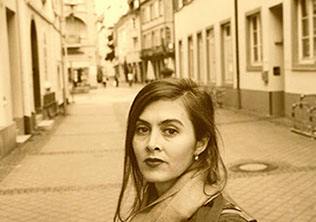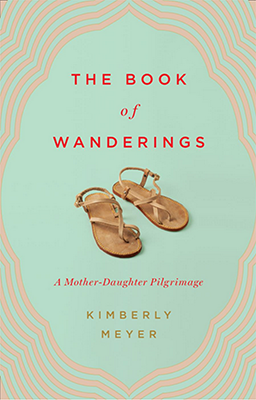Kimberly Meyer holds a doctoral degree in Literature and Creative Writing from the University of Houston, where she was the recipient of several fellowships and grants.
She teaches in The Human Situation sequence for the Honors College at the University of Houston as well as courses in Creative Writing. Her essays and poetry have appeared in a variety of journals and magazines, including The Best American Travel Writing, Ploughshares, The Kenyon Review, Ecotone, The Oxford American, The Georgia Review, Agni, The Southern Review, and Third Coast.
An audio-documentary she produced aired on Public Radio International's This American Life. Her work has been nominated for a Pushcart Prize and has been awarded a Houston Arts Alliance grant and an Inprint/Michener Fellowship in Non-Fiction, and she has received fellowships to attend the Bread Loaf Writer's Conference and the Vermont Studio Center.
She lives in Houston with her husband and three daughters.
 6.28.2015 Kimberly Meyer: On leaving to find your writing voice
6.28.2015 Kimberly Meyer: On leaving to find your writing voice

When Houstonian Kimberly Meyer became a mother during her senior year of college, her life changed in ways she could never expect. She had always thought she would travel, but had to set that goal aside. But she never gave up the dream of finding meaning through journey. Years later, she also wanted to share the experience with her oldest daughter, now in college.
The duo left their Houston home behind and spent a summer retracing the footsteps of Felix Fabri, a medieval Dominican friar in whose own travel writings Kimberly found inspiration. Their trip formed the basis of her memoir The Book of Wanderings (Little, Brown, 2015).
On the eve of a trip back to Israel, Kimberly talked with Lone Star Literary about her writing life and her singular journey in Lone Star Listens.
LONE STAR LITERARY LIFE: Kimberly, how did you ever get your daughter to let you write this book? I think anyone who knows teenaged or grown daughters would love to know the answer to that question.
KIMBERLY MEYER: The truth is that I didn't ask! But I've written about all three of my daughters over the years in many essays, all of which Ellie has read. She told me once that she was my biggest fan. So I think it was just assumed, when I asked Ellie to go with me on that journey, that I would write about it and that she would be part of the story. But as I wrote, I showed her particularly personal passages that I wanted to make sure I had accurately portrayed. And she gave me her own journal from that trip to work from as I wrote. I could never have published this book without her support or approval.
You grew up in The Woodlands, a green, upscale suburb of Houston. Was there something about the area that inspired you to write?
Growing up in The Woodlands, I wasn't at all inspired to write about it. Everything was so new, and what has always driven my imagination and curiosity is the past, and worlds beyond my own. So in some crucial way, The Woodlands inspired me to seek out those other worlds, because what I needed most was not there. The funny thing is that in graduate school, I researched the origins and early years of The Woodlands and became totally fascinated by that history. And now we live in Houston, in the city itself, and I see stories all around me that I want to write down — stories about the immigrant communities who have made this city their home, stories about the Third Ward near the University of Houston, where I teach, stories about the murder of the daughter of the Italian family who built the house we live in here in the Heights.
When did you know you wanted to be a writer?
I think I knew I wanted to be a writer long before I admitted to myself and said out loud that I wanted to be a writer, which I only did, finally, this last year, when my first book was published. Before that, I was hedging my bets, just in case it didn't work out. But from the time I was five or six, I was always writing in a diary or a notebook, documenting my days, trying to get down what I didn't want to forget, trying to find the right words. When I was in middle school, I wrote to National Geographic to ask how I could write for them. The editors very kindly actually responded and told me that their writers are usually experts in their field. I'm still trying to figure out how to write something for them some day!
Who gave you your first break? How did you capitalize on it?
I owe everything I've ever published — and in particular this book — to Inprint, the wonderful literary arts organization in Houston. The first writing class I ever took — when I was pregnant with my youngest daughter — was a personal essay class offered by Inprint. I later took poetry classes there with an instructor who was a student in the University of Houston Creative Writing Program. The poems I wrote for his class — about ants and motherhood (long story) — ended up winning a big contest. They also got me accepted into the Creative Writing Program.
The University of Houston's creative writing program has been recognized as one of the tops in the nation. What makes this such a great program for writers?
Besides some really devoted writers who teach in the program — the poet Tony Hoagland, for example, and the fiction writer, Antonya Nelson, both of whom I was lucky enough to work with — the University of Houston Creative Writing Program insists on a strong grounding in literature. For the PhD, you take much of the same coursework and sit for the same doctoral exams as you would if you were a candidate in literature. I think if you want to write well, you have to read well and wide and deep. You have to listen to voices that are speaking in a different idiom, and not merely your contemporaries. The Creative Writing Program at the University of Houston forces you to have conversations inside your head with all of these other figures who are part of the long tradition that you want to enter.
Where do you fall on the recurring question of ‘Can writing be taught’?
Of course it can! But I'm not all that interested in the surface understanding of what we mean when we say that writing can be taught. Of course we can be taught to use more active verbs, to write snappier dialogue, to show not tell. And beyond that, we can be taught how to shape stories and essays and poems by being told what to cut and by being asked questions that provoke us to fill in gaps we have left. But what writing can really teach us, by forcing us to pay close attention, is how to be engaged with the world outside us and the world within us. Because if we can't see it, we can't say it. Writing teaches us how to do both.
The Book of Wanderings is such a profound journey book; which literary journeys have inspired you?
So many! The ancient stories: The Odyssey, which I teach regularly, and Gilgamesh. American literature is filled with road trips that have shaped my understanding of this country: Mary Rowlandson's The Sovereignty and Goodness of God, about her journey, actual and spiritual, in captivity among Native Americans; The Adventures of Huckleberry Finn; The Grapes of Wrath. I love certain Modernist journeys into the fragmented psyche: T. S. Eliot's The Wasteland and Joseph Conrad's Heart of Darkness. Conrad's meditation on the horrors of the colonialist enterprise in Africa reminds me that I love, too, Isak Dinesen's Out of Africa and The Painted Veil by W. Somerset Maugham and A Passage to India by E. M. Forster. For a little postmodern fun, there's David Foster Wallace's essay, “A Supposedly Fun Thing I'll Never Do Again.”
Which Texas authors inspired you — either growing up or in later years?
I think he lives in New Mexico now, but at one point he lived in El Paso, so I'm counting Cormac McCarthy. What he does with language is a mystery. He seems to call the world into being with it the way God does at the beginning of the Book of Genesis. There seems to be a similar dark sacred force in his words.
After the trip you describe in The Book of Wanderings, have your other daughters requested similar journeys upon graduation?
Oh, I've insisted and they want to go! My husband and I have always traveled with our daughters, all together and separately. To be cut off from the clutter of daily life forces you to focus on those you are traveling with and it allows you to have these shared experiences that seem harder and harder to have at home, where everyone has a computer or an iPod to tune into, and where we all have our own rooms. My middle daughter and I want to go to Greece together. We're both lovers of the ancient myths and art and architecture. And my youngest daughter and I want to go to Mexico. She's fluent in Spanish, and I want to learn and then we'll both practice together.
Last question: What’s your favorite Texas road trip?
I love heading west. One of my favorite drives we ever made was from Houston to Big Bend on Highway 90. It was so desolate out there near Langtry in that desert of ocotillo and agave that birds kept flying into the windshield of our car as if they'd never seen one before.
* * * * *
Praise for Kimberly Meyer's THE BOOK OF WANDERINGS
“Meyer's poetic voice and sincerity make this quest not a gimmick but a richly felt expedition.... The book's life comes from Meyer's pondering the years of waiting and wondering if she would ever do what she had dreamed of so long ago and whether it would bring her all that she hoped. An uncommonly rich and spiritual book, The Book of Wanderings speaks not just to satisfying wanderlust but to finding home in this world or beyond.” ―Eloise Kinney, Booklist
“Expansive [and] finely observed.” ―Kate Tuttle, Boston Globe
“Intriguing and ambitious.... Meyer has a keen eye for detail and a graceful way with words. Her descriptions are brilliantly crafted - so ripe one is transported with her.... The arduousness and soul-baring nature of the long journey seems to have stripped her down to her essence, and she is able to confidently experience and tell the story in her own words, excellently, compellingly.” ―Sharon Peters, USA Today
“Meyer's memoir about her pilgrimage with her daughter Ellie will make you feel virtually transported to some of the world's most exotic and rich locations (Venice, Cyprus, Alexandria), but that's not the most rewarding part. Her story of forging and solidifying her bond with daughter Ellie is what will impact you the most deeply, leaving you with an intense need to talk to your mom.” ―Lynsey Eidell, Glamour
“Meyer ably contrasts the mundane frustrations of travel-language confusion, unfamiliar food, unreliable transportation-and the transcendent moments when you make that ineffable connection with those who came before you, 'swallowed up...in...the sweep of historical time.” ―Michelle Newby, Lone Star Literary Life

